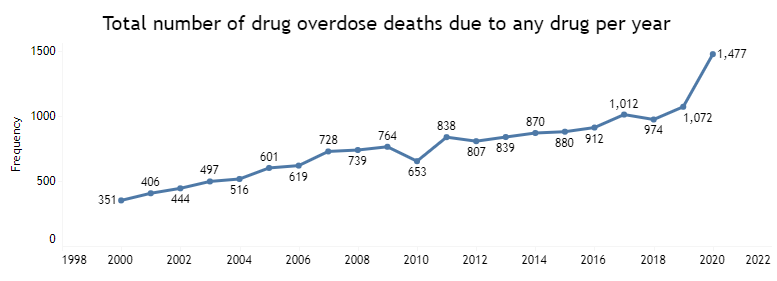Denver starts shipping overdose-reversing drugs to residents, but backlog remains

DENVER — In mid-February, the Denver Department of Public Health and Environment (DDPHE) announced that Denver residents could order fentanyl testing strips and the opioid overdose-reversing drug naloxone directly from the city, free of charge.
More than one month later, DDPHE has received nearly 4,500 requests for naloxone — often referred to as Narcan, a name-brand version of the drug — and fentanyl testing strips. Distribution issues, coupled with high demand, has resulted in just a few people receiving their orders.
In an email to Rocky Mountain PBS, DDPHE officials said the department does not have any naloxone in house.
“We have placed an order for more than 4,000 kits from the distributor, but they have not been shipped which tells us they likely do not have them in stock,” said Courtney Meihls, a marketing and communications specialist with DDPHE.
Meihls said the free naloxone distribution program started in September 2021 but was more publicized in mid-February of this year, including by DDPHE. From September to mid-February, DDPHE received just 380 orders for naloxone. The department was able to fill those orders, but has become overwhelmed by the number of requests since mid-February.
“So the increase, while amazing because of the number of people who want to help their neighbors, is quite dramatic and depleted our supply in-house,” Meihls said. She could not provide an estimated date for when the city's order would be filled.
The limited supply is a continuation of a problem that Rocky Mountain PBS reported on in November: individuals and organizations are struggling to obtain drugs like naloxone while the state’s opioid overdose crisis worsens.
[Related: Denver’s Harm Reduction Action Center struggled to secure Narcan during worsening overdose crisis]
From 2000 to 2020, the Colorado Department of Public Health and Environment (CPDHE) recorded 15,999 overdoses deaths in the state. Nearly one in five of those deaths occurred in Denver.

The crisis has only gotten worse: CDPHE recorded 1,757 total drug overdose deaths among Colorado residents in 2021, a record high. Two-thirds of those deaths involved opioids.
In Denver, the surge in opioid deaths has been driven by fentanyl, a synthetic painkiller that is “similar to morphine but about 100 times more potent,” according to the Drug Enforcement Agency. In 2021, 49.8% of drug-related deaths in Denver involved fentanyl. In 2019, for comparison, that figure was 24.9%.
Demand for the overdose-reversing drugs in Denver rose after five people died of suspected fentanyl overdoses in a Commerce City apartment last month.
Colorado has seen one of the sharpest rises in fentanyl-related deaths in the country in recent years. In the last two years, fentanyl-related deaths have increased five-fold in Colorado, according to a recent report by the nonprofit advocacy group Families Against Fentanyl. Between 2015 and 2021, fentanyl deaths increased more than 1000% in Colorado, the report found.
“We are in the worst overdose crisis we've ever seen in the United States, Colorado, and in Denver,” said Lisa Raville, executive director of Denver’s Harm Reduction Action Center, in an interview with Rocky Mountain PBS last year. “There is a lot of grief happening among people who use drugs among service providers, because people we know, love, and serve are dying of preventable overdoses and it doesn't have to be so.”
Meihls told Rocky Mountain PBS that while DDPHE’s naloxone supply is back-ordered, there are other options. For immediate assistance, she recommended people visit Denver’s “Wellness Winnie,” an RV that provides Narcan/naloxone, as well as syringe or needle disposal, behavioral health screenings, clothes and more. You can find the Wellness Winnie location and schedule here.
People can also buy naloxone at several pharmacies across Denver. The Harm Reduction Action Center has a map of pharmacies with naloxone available here.
Related Story
If you or someone you know is experiencing an overdose, call 911 immediately. Signs of an overdose include:
- Unresponsiveness or loss of consciousness
- Small pupils
- Blueish, pale or cold skin
- Abnormal breathing
- Fast, slowed, or irregular pulse
- Nausea and vomiting
- Limp body
Resources:
Kyle Cooke is the digital media manager at Rocky Mountain PBS. You can reach him at kylecooke@rmpbs.org.
